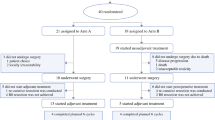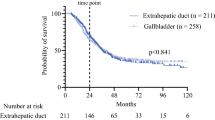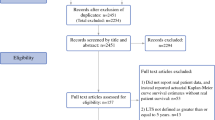Abstract
Background
Despite the increasing use of neoadjuvant treatment, the question of whether preoperatively treated, successfully resected patients should receive additional postoperative adjuvant treatment remains unanswered. We evaluate the impact of adjuvant therapy following neoadjuvant treatment and pancreatectomy in pancreatic cancer patients in a large national study.
Methods
We used the National Cancer Data Base between 2006 and 2013 to identify resected, non-metastatic pancreatic adenocarcinoma patients who received neoadjuvant chemo(radio)therapy followed by pancreatectomy. Kaplan-Meier and multivariate Cox proportional hazard regression analyses were performed to compare survival between groups.
Results
In total, 1357 patients were identified. Of the patients, 38.6% (n = 524) were treated with postoperative therapy. There was no difference in unadjusted median overall survival between patients who did and did not receive postoperative therapy (median survival, 27.5 vs. 27.1 months, log-rank p = 0.5409). Postoperative therapy was not significantly associated with favorable prognosis in patients with positive resection margins (log-rank p = 0.6452) or positive lymph nodes (log-rank p = 0.6252). On multivariate analysis, receipt of postoperative therapy was not predictive of survival (hazard ratio 0.972; 95% CI 0.848–1.115; p = 0.6876).
Conclusions
Our results using national data suggest that after receipt of neoadjuvant therapy and pancreatectomy, additional postoperative therapy may not provide additional survival benefit. These data warrant further prospective data collection and consideration for clinical trials.





Similar content being viewed by others
References
Mayo SC, Nathan H, Cameron JL, Olino K, Edil BH, Herman JM et al. Conditional survival in patients with pancreatic ductal adenocarcinoma resected with curative intent. Cancer. 2012;118(10):2674–81. doi:10.1002/cncr.26553.
Cancer stat facts: pancreas cancer. Retrieved from https://seer.cancer.gov/statfacts/html/pancreas.html. Accessed May 8 2017.
Groot VP, Rezaee N, Wu W, Cameron JL, Fishman EK, Hruban RH et al. Patterns, timing, and predictors of recurrence following pancreatectomy for pancreatic ductal adenocarcinoma. Ann Surg. 2017. doi:10.1097/SLA.0000000000002234.
Neoptolemos JP, Dunn JA, Stocken DD, Almond J, Link K, Beger H et al. Adjuvant chemoradiotherapy and chemotherapy in resectable pancreatic cancer: a randomised controlled trial. Lancet. 2001;358(9293):1576–85.
Oettle H, Neuhaus P, Hochhaus A, Hartmann JT, Gellert K, Ridwelski K et al. Adjuvant chemotherapy with gemcitabine and long-term outcomes among patients with resected pancreatic cancer: the CONKO-001 randomized trial. JAMA. 2013;310(14):1473–81. doi:10.1001/jama.2013.279201.
de Geus SW, Bliss LA, Eskander MF, Ng SC, Vahrmeijer AL, Mahadevan A et al. A tale of two cities: reconsidering adjuvant radiation in pancreatic cancer care. J Gastrointest Surg. 2016;20(1):85–92; discussion doi:10.1007/s11605-015-2951-8.
Kleeff J, Korc M, Apte M, La Vecchia C, Johnson CD, Biankin AV et al. Pancreatic cancer. Nat Rev Dis Primers. 2016;2:16022. doi:10.1038/nrdp.2016.22.
Neoptolemos JP, Palmer DH, Ghaneh P, Psarelli EE, Valle JW, Halloran CM et al. Comparison of adjuvant gemcitabine and capecitabine with gemcitabine monotherapy in patients with resected pancreatic cancer (ESPAC-4): a multicentre, open-label, randomised, phase 3 trial. Lancet. 2017;389(10073):1011–24. doi:10.1016/S0140-6736(16)32409-6.
Khorana AA, Mangu PB, Berlin J, Engebretson A, Hong TS, Maitra A et al. Potentially curable pancreatic cancer: American Society of Clinical Oncology clinical practice guideline update. J Clin Oncol. 2017:JCO2017724948. doi:10.1200/JCO.2017.72.4948.
Bilimoria KY, Bentrem DJ, Ko CY, Tomlinson JS, Stewart AK, Winchester DP et al. Multimodality therapy for pancreatic cancer in the U.S.: utilization, outcomes, and the effect of hospital volume. Cancer. 2007;110(6):1227–34. doi:10.1002/cncr.22916.
Labori KJ, Katz MH, Tzeng CW, Bjornbeth BA, Cvancarova M, Edwin B et al. Impact of early disease progression and surgical complications on adjuvant chemotherapy completion rates and survival in patients undergoing the surgery first approach for resectable pancreatic ductal adenocarcinoma—a population-based cohort study. Acta Oncol. 2016;55(3):265–77. doi:10.3109/0284186X.2015.1068445.
Tzeng CW, Tran Cao HS, Lee JE, Pisters PW, Varadhachary GR, Wolff RA et al. Treatment sequencing for resectable pancreatic cancer: influence of early metastases and surgical complications on multimodality therapy completion and survival. J Gastrointest Surg. 2014;18(1):16–24; discussion -5. doi:10.1007/s11605-013-2412-1.
Piperdi M, McDade TP, Shim JK, Piperdi B, Kadish SP, Sullivan ME et al. A neoadjuvant strategy for pancreatic adenocarcinoma increases the likelihood of receiving all components of care: lessons from a single-institution database. HPB (Oxford). 2010;12(3):204–10. doi:10.1111/j.1477-2574.2009.00150.x.
Fathi A, Christians KK, George B, Ritch PS, Erickson BA, Tolat P et al. Neoadjuvant therapy for localized pancreatic cancer: guiding principles. J Gastrointest Oncol. 2015;6(4):418–29. doi:10.3978/j.issn.2078-6891.2015.053.
Evans DB, Multidisciplinary Pancreatic Cancer Study G. Resectable pancreatic cancer: the role for neoadjuvant/preoperative therapy. HPB (Oxford). 2006;8(5):365–8. doi:10.1080/13651820600804005.
Youngwirth LM, Nussbaum DP, Thomas S, Adam MA, Blazer DG, III, Roman SA et al. Nationwide trends and outcomes associated with neoadjuvant therapy in pancreatic cancer: an analysis of 18,243 patients. J Surg Oncol. 2017. doi:10.1002/jso.24630.
Pancreatic adenocarcinoma. Version 2.2104. NCCN Clinical Practice Guideline in Oncology (NCCN Guidelines) 2014.
Roland CL, Katz MH, Tzeng CW, Lin H, Varadhachary GR, Shroff R et al. The addition of postoperative chemotherapy is associated with improved survival in patients with pancreatic cancer treated with preoperative therapy. Ann Surg Oncol. 2015;22 Suppl 3:S1221–8. doi:10.1245/s10434-015-4854-z.
Raval MV, Bilimoria KY, Stewart AK, Bentrem DJ, Ko CY. Using the NCDB for cancer care improvement: an introduction to available quality assessment tools. J Surg Oncol. 2009;99(8):488–90. doi:10.1002/jso.21173.
Bilimoria KY, Stewart AK, Winchester DP, Ko CY. The National Cancer Data Base: a powerful initiative to improve cancer care in the United States. Ann Surg Oncol. 2008;15(3):683–90. doi:10.1245/s10434-007-9747-3.
Facility Oncology Registry Data Standards. Chicago: Commission on Cancer; 2004.
Greene FL. The American Joint Committee on Cancer: updating the strategies in cancer staging. Bull Am Coll Surg. 2002;87(7):13–5.
Deyo RA, Cherkin DC, Ciol MA. Adapting a clinical comorbidity index for use with ICD-9-CM administrative databases. J Clin Epidemiol. 1992;45(6):613–9.
Nuttall M, van der Meulen J, Emberton M. Charlson scores based on ICD-10 administrative data were valid in assessing comorbidity in patients undergoing urological cancer surgery. J Clin Epidemiol. 2006;59(3):265–73. doi:10.1016/j.jclinepi.2005.07.015.
Nitsche U, Kong B, Balmert A, Friess H, Kleeff J. Should every patient with pancreatic cancer receive perioperative/neoadjuvant therapy? Indian J Med Paediatr Oncol. 2016;37(4):211–3. doi:10.4103/0971-5851.195731.
Christians KK, Heimler JW, George B, Ritch PS, Erickson BA, Johnston F et al. Survival of patients with resectable pancreatic cancer who received neoadjuvant therapy. Surgery. 2016;159(3):893–900. doi:10.1016/j.surg.2015.09.018.
Takai S, Satoi S, Yanagimoto H, Toyokawa H, Takahashi K, Terakawa N et al. Neoadjuvant chemoradiation in patients with potentially resectable pancreatic cancer. Pancreas. 2008;36(1):e26–32. doi:10.1097/mpa.0b013e31814b229a.
Golcher H, Brunner TB, Witzigmann H, Marti L, Bechstein WO, Bruns C et al. Neoadjuvant chemoradiation therapy with gemcitabine/cisplatin and surgery versus immediate surgery in resectable pancreatic cancer: results of the first prospective randomized phase II trial. Strahlenther Onkol. 2015;191(1):7–16. doi:10.1007/s00066-014-0737-7.
de Geus SW, Evans DB, Bliss LA, Eskander MF, Smith JK, Wolff RA et al. Neoadjuvant therapy versus upfront surgical strategies in resectable pancreatic cancer: a Markov decision analysis. Eur J Surg Oncol. 2016;42(10):1552–60. doi:10.1016/j.ejso.2016.07.016.
Dimou F, Sineshaw H, Parmar AD, Tamirisa NP, Jemal A, Riall TS. Trends in receipt and timing of multimodality therapy in early-stage pancreatic cancer. J Gastrointest Surg. 2016;20(1):93–103; discussion doi:10.1007/s11605-015-2952-7.
Uesaka K, Boku N, Fukutomi A, Okamura Y, Konishi M, Matsumoto I et al. Adjuvant chemotherapy of S-1 versus gemcitabine for resected pancreatic cancer: a phase 3, open-label, randomised, non-inferiority trial (JASPAC 01). Lancet. 2016;388(10041):248–57. doi:10.1016/S0140-6736(16)30583-9.
Mellon EA, Springett GM, Hoffe SE, Hodul P, Malafa MP, Meredith KL et al. Adjuvant radiotherapy and lymph node dissection in pancreatic cancer treated with surgery and chemotherapy. Cancer. 2014;120(8):1171–7. doi:10.1002/cncr.28543.
Liu Z, Luo G, Guo M, Jin K, Xiao Z, Liu L et al. Lymph node status predicts the benefit of adjuvant chemoradiotherapy for patients with resected pancreatic cancer. Pancreatology. 2015;15(3):253–8. doi:10.1016/j.pan.2015.03.012.
Kooby DA, Gillespie TW, Liu Y, Byrd-Sellers J, Landry J, Bian J et al. Impact of adjuvant radiotherapy on survival after pancreatic cancer resection: an appraisal of data from the National Cancer Data Base. Ann Surg Oncol. 2013;20(11):3634–42. doi:10.1245/s10434-013-3047-x.
McDade TP, Hill JS, Simons JP, Piperdi B, Ng SC, Zhou Z et al. A national propensity-adjusted analysis of adjuvant radiotherapy in the treatment of resected pancreatic adenocarcinoma. Cancer. 2010;116(13):3257–66. doi:10.1002/cncr.25069.
McDonald AM, Dulaney CR, Lopez-Araujo J, Posey JA, Keene KS, Christein JD et al. Patterns of failure for lymph node-positive resected pancreatic adenocarcinoma after adjuvant radiotherapy or gemcitabine-based chemotherapy alone. J Gastrointest Cancer. 2015;46(2):149–55. doi:10.1007/s12029-015-9702-7.
Bergquist JR, Puig CA, Shubert CR, Groeschl RT, Habermann EB, Kendrick ML et al. Carbohydrate antigen 19-9 elevation in anatomically resectable, early stage pancreatic cancer is independently associated with decreased overall survival and an indication for neoadjuvant therapy: a National Cancer Database study. J Am Coll Surg. 2016;223(1):52–65. doi:10.1016/j.jamcollsurg.2016.02.009.
Kim C, Owen D, Gill S. Real-world impact of availability of adjuvant therapy on outcomes in patients with resected pancreatic adenocarcinoma: a Canadian Cancer Agency experience. Am J Clin Oncol. 2012;35(3):212–5. doi:10.1097/COC.0b013e318209d36c.
Merkow RP, Bilimoria KY, Tomlinson JS, Paruch JL, Fleming JB, Talamonti MS et al. Postoperative complications reduce adjuvant chemotherapy use in resectable pancreatic cancer. Ann Surg. 2014;260(2):372–7. doi:10.1097/SLA.0000000000000378.
Acknowledgements
Research reported in this publication was supported by the NIDDK of the NIH under Award Number T32DK007754. The content is solely the responsibility of the authors and does not necessarily represent the official views of the National Institutes of Health.
Author information
Authors and Affiliations
Contributions
All authors meet the International Committee of Medical Journal Editors authorship criteria.
Corresponding author
Ethics declarations
Funding
This work was supported by the MSRG-10-003-01-CPHPS Mentored Research Scholar Grant of the American Cancer Society (J.F. Tseng) and an American Surgical Association Foundation Fellowship (J.F. Tseng) and the NIH NIDDK T32DK007754 (to G.G. Kasumova)
Competing Interests
The authors declare that they have no competing interests.
Rights and permissions
About this article
Cite this article
de Geus, S.W.L., Kasumova, G.G., Eskander, M.F. et al. Is Neoadjuvant Therapy Sufficient in Resected Pancreatic Cancer Patients? A National Study. J Gastrointest Surg 22, 214–225 (2018). https://doi.org/10.1007/s11605-017-3541-8
Received:
Accepted:
Published:
Issue Date:
DOI: https://doi.org/10.1007/s11605-017-3541-8




